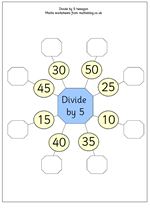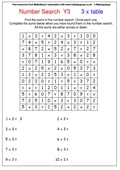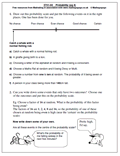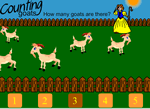 Learning tables is considered an essential to maths progress, and indeed, it is vital. But knowing tables is only a starting point: these facts then need to be used. The most obvious use other than to multiply numbers is to do the reverse; to divide numbers. We have a number of resources which look dividing ‘in your head’ including this one on divide by 5 mentally.
Learning tables is considered an essential to maths progress, and indeed, it is vital. But knowing tables is only a starting point: these facts then need to be used. The most obvious use other than to multiply numbers is to do the reverse; to divide numbers. We have a number of resources which look dividing ‘in your head’ including this one on divide by 5 mentally.
Essentially it is the reverse of a times table sheet and highlights that if 4 x 5 = 20 is known then 20 divided by 4 = 5 should come quickly after it.


